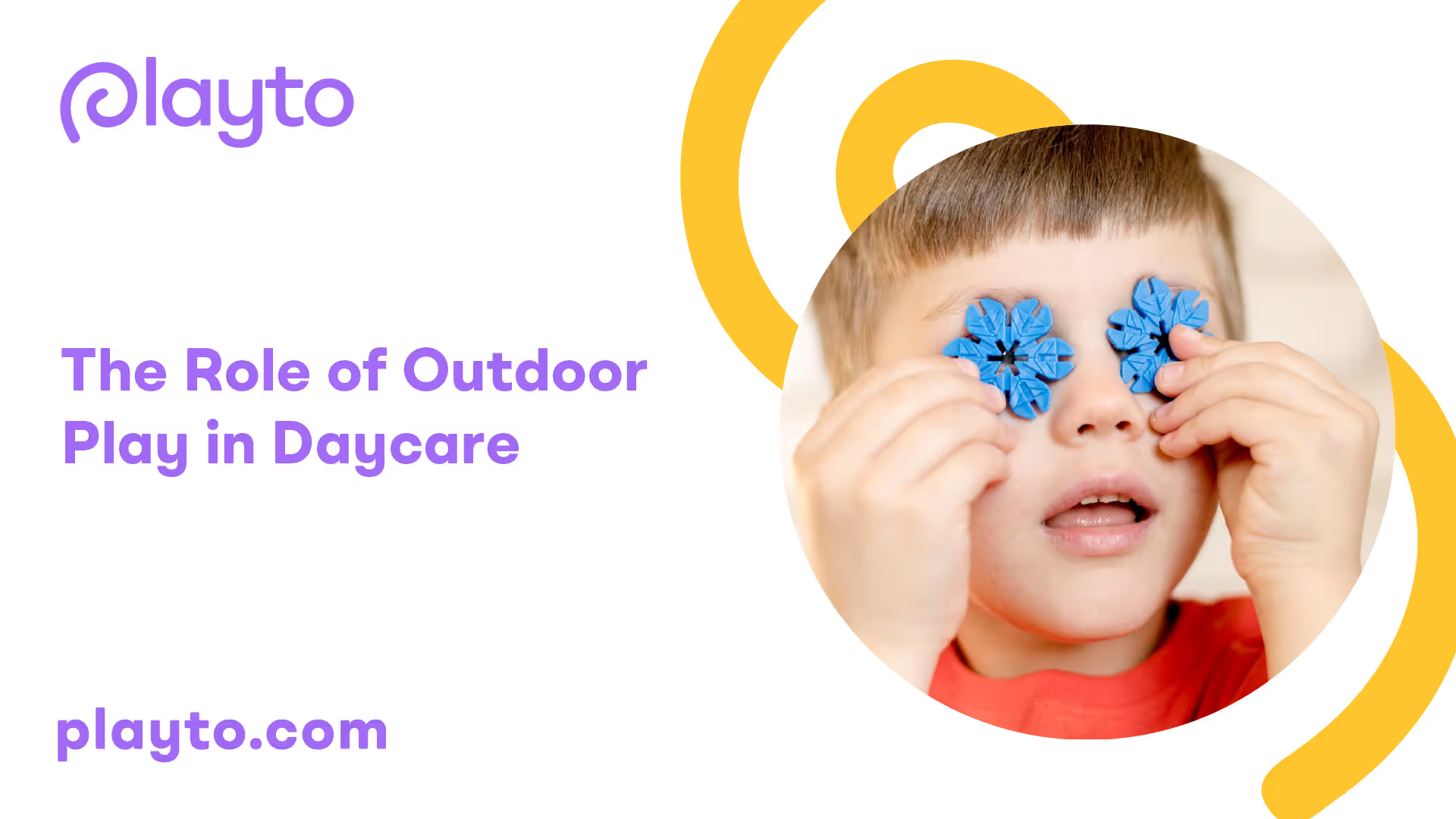Importance of Outdoor Play in Daycare

Outdoor play plays a crucial role in the development and well-being of children in daycare. It offers a multitude of benefits while also presenting unique challenges that need to be addressed.
Benefits of Outdoor Play
Engaging in outdoor play provides children with numerous physical, cognitive, social, and emotional benefits. Research shows that outdoor play fosters cognitive development by allowing children to experiment, solve problems, think creatively, and cooperate with others, thereby enhancing their cognitive skills and overall intelligence.
Physically, outdoor play contributes to the healthy growth and development of children. It promotes physical strength, coordination, and the development of large motor skills. Additionally, outdoor play allows children to engage in activities that support cardiovascular and muscular fitness, bone health, and healthy weight, such as running, climbing, and active play [2]. It also aids in the production of vitamin D, which is essential for maintaining healthy bones and immune system function [3].
Moreover, outdoor play provides children with opportunities for social interaction, cooperation, and the development of social skills. It fosters positive self-esteem, autonomy, and confidence, as children learn to navigate social situations, negotiate, and form relationships with their peers. Outdoor play facilitates the development of social-emotional skills, such as empathy, resilience, and emotional regulation, which are crucial for their overall emotional well-being [4].
Challenges of Outdoor Play
While outdoor play offers numerous benefits, it also presents challenges that need to be addressed in daycare settings. Weather conditions, safety concerns, and limited outdoor space can pose challenges to outdoor play. Daycare providers must ensure that outdoor play areas are safe and appropriate for children, taking into account factors such as equipment safety, supervision, and age-appropriate activities.
Additionally, urbanization and the rise of technology have led to a decrease in outdoor playtime for children. Increased screen time and sedentary behavior can negatively impact children's overall health and development. It is crucial for daycare providers and parents to recognize the importance of outdoor play and actively encourage and facilitate opportunities for children to engage in outdoor activities.
In conclusion, outdoor play is essential for the healthy growth and development of children in daycare. It provides numerous physical, cognitive, social, and emotional benefits. While challenges may arise, it is important to prioritize and promote outdoor play in daycare settings, ensuring safe and stimulating outdoor environments that allow children to explore, learn, and thrive.

Role of Outdoor Play in Child Development
Outdoor play plays a vital role in the overall development of children. It offers numerous benefits across physical, social and emotional, and cognitive domains.
Physical Development
Outdoor play provides children with opportunities to engage in physical activities that promote their physical development. Activities like running, climbing, and playing active games help support cardiovascular and muscular fitness, bone health, and healthy weight. These activities get their hearts pumping, blood flowing, and contribute to the development of their coordination and motor skills. It also aids in the development of their immune system and helps produce essential vitamin D.
Social and Emotional Development
Engaging in outdoor play allows children to develop important social and emotional skills. It provides them with opportunities to interact and collaborate with peers, make new friends, and navigate social relationships. Through positive interactions and shared experiences, children learn problem-solving, turn-taking, encouragement, self-control, and empathy. These skills are crucial for building positive relationships and for success in future school and social interactions.
Outdoor play also fosters the development of confidence, independence, and emotional well-being. Children gain a sense of self-awareness and autonomy as they navigate the outdoor environment, take risks, and challenge themselves. Being in nature and engaging with the outdoor world allows children to appreciate their surroundings and develop a connection with the environment [3].
Cognitive Development
Outdoor play provides valuable opportunities for children's cognitive development. It stimulates their curiosity, problem-solving abilities, and creativity. As children explore the outdoor environment, they encounter new experiences, challenges, and natural elements that require them to think critically and make decisions. This fosters cognitive skills such as observation, exploration, experimentation, and spatial awareness.
Research indicates that outdoor play supports the development of cognitive, social and emotional, and self-regulatory skills. It helps children become appraisers of risk, enhances their ability to assess and manage challenges, and contributes to their overall cognitive growth.
Incorporating outdoor play into daycare environments provides children with a well-rounded developmental experience. It offers opportunities for physical activity, social interaction, and cognitive engagement that contribute to their overall growth and well-being. By creating supportive outdoor environments and encouraging regular outdoor playtime, caregivers can help foster the holistic development of children in daycare settings

Incorporating Outdoor Play in Daycare
To foster a well-rounded environment for children in daycare, it is essential to incorporate outdoor play alongside indoor activities. Outdoor play offers numerous benefits for children's development, allowing them to explore, interact, and engage with their surroundings. In this section, we will explore two important aspects of incorporating outdoor play in daycare: designing outdoor play areas and balancing indoor and outdoor play.
Designing Outdoor Play Areas
Designing well-planned and stimulating outdoor play areas is critical for providing a safe and engaging environment for children in daycare. Here are some considerations when designing outdoor play areas:
- Safety: Ensure that the play area is free from potential hazards, such as sharp objects, uneven surfaces, and dangerous equipment. Regular inspections and maintenance are necessary to keep the play area safe and secure.
- Age-Appropriate Equipment: Select age-appropriate play equipment that suits the developmental needs and abilities of the children in your daycare. This can include swings, slides, climbing structures, sandboxes, and open spaces for running and exploring.
- Variety and Diversity: Provide a diverse range of play opportunities to cater to different interests and abilities. Incorporate elements that promote imaginative play, physical activity, sensory experiences, and cooperative play.
- Natural Elements: Integrate natural elements like plants, trees, and natural materials into the play area. This helps children connect with nature, stimulates their senses, and encourages exploration and creativity.
- Shade and Shelter: Ensure that the play area offers adequate shade and shelter to protect children from extreme weather conditions, such as excessive heat or rain. This allows for year-round outdoor play opportunities.
For more detailed guidance on designing outdoor play areas, consult resources specific to your location and regulations provided by child care authorities.
Balancing Indoor and Outdoor Play
Balancing indoor and outdoor play is essential to provide a well-rounded experience for children in daycare. While indoor play has its benefits, outdoor play offers unique opportunities for children's development. Here are some strategies to achieve a healthy balance:
- Structured Schedule: Create a daily schedule that includes dedicated time for both indoor and outdoor play. This ensures that children have regular opportunities to engage in outdoor activities while still allowing for structured learning experiences indoors.
- Weather Considerations: Plan alternative activities for inclement weather days to ensure that outdoor play is not completely dependent on favorable conditions. Indoor gross motor activities, arts and crafts, or music and dance sessions can be incorporated during unfavorable weather.
- Intentional Integration: Connect indoor and outdoor activities to create a cohesive learning experience. For example, bring nature-themed activities indoors or extend classroom lessons to the outdoor environment. This integration helps children make connections and reinforces their learning.
- Flexibility: Allow flexibility within the schedule to adapt to children's interests and needs. Pay attention to their cues and preferences, and adjust the balance between indoor and outdoor play accordingly.
By designing engaging outdoor play areas and finding the right balance between indoor and outdoor play, daycare providers can create an environment that promotes children's holistic development. Remember to consult local regulations and consider specific recommendations from child care authorities to ensure the safety and well-being of the children in your care.
Strategies for Maximizing Outdoor Play
To fully harness the benefits of outdoor play in daycare, it is important to implement strategies that encourage daily outdoor time, ensure supervision and safety, and promote active play.
Encouraging Daily Outdoor Time
Encouraging children to spend time outdoors on a daily basis is crucial for their overall development. It is recommended that children engage in at least 60 minutes of moderate to vigorous physical activity each day, and outdoor play provides an excellent opportunity to achieve this goal.
Daycare providers can incorporate outdoor play into daily routines by scheduling dedicated outdoor playtime. This can be done in the morning or afternoon, allowing children to engage in various activities such as running, climbing, jumping, and playing games. By making outdoor play a regular part of the daycare experience, children will develop a love for nature and reap the numerous benefits it offers.
Supervision and Safety Measures
While outdoor play is essential, ensuring the safety and well-being of children is of utmost importance. Daycare providers should establish clear guidelines for outdoor play and implement appropriate supervision measures.
Supervising children during outdoor play involves being actively present, monitoring their activities, and intervening when necessary to prevent accidents or conflicts. Adequate staff-to-child ratios should be maintained to ensure effective supervision.
Additionally, creating a safe outdoor environment is crucial. This includes regularly inspecting play equipment for any potential hazards, ensuring proper surfacing to minimize the risk of falls, and securing the play area to prevent unauthorized access.
Promoting Active Play
Active play is an integral part of outdoor play and contributes to children's physical development. It is important to provide a variety of play opportunities that encourage active movement and exercise.
Daycare providers can set up play areas that stimulate physical activity, such as climbing structures, swings, balance beams, and open spaces for running and playing games. Offering a diverse range of play equipment and materials allows children to engage in different types of active play, enhancing their motor skills and overall physical fitness.
Furthermore, caregivers can actively participate in outdoor play by organizing group activities, such as relay races, obstacle courses, or nature scavenger hunts. This not only promotes physical activity but also fosters social interaction and cooperation among children.
By implementing these strategies, daycare providers can maximize the benefits of outdoor play and create an environment that supports children's physical, social, and emotional development. To learn more about the role of play in daycare, visit our article on the role of play in daycare.
Overcoming Barriers to Outdoor Play
While outdoor play in daycare settings is crucial for children's development, there are various barriers that can hinder its implementation. Two common barriers are urbanization and technology, as well as parental concerns.
Urbanization and Technology
As urban areas continue to expand and technology becomes more prevalent in children's lives, opportunities for outdoor play are diminishing. Factors such as globalization, urban growth, and the rise of technology have led to a decrease in outdoor playtime for children [1]. Children are spending more time indoors with structured activities, which impacts their access to the benefits of outdoor play.
Urbanization poses challenges in terms of limited outdoor space and safety concerns. Parents may worry about accidents, interactions with strangers, and car traffic, leading them to keep their children indoors. Additionally, the lure of technology and screen-based activities can divert children's attention away from outdoor play.
To overcome these barriers, it's important for daycare providers, educators, and parents to collaborate and find creative solutions. This may include utilizing available outdoor spaces effectively, implementing safety measures, and promoting outdoor play as an essential component of a child's daily routine.
Parental Concerns
Parents play a significant role in shaping children's experiences, including their access to outdoor play. Concerns about accidents, interactions with strangers, and car traffic are some of the reasons parents may choose to keep their children indoors with structured activities. While parents' concerns for their children's safety are valid, it's important to strike a balance between safety and providing opportunities for outdoor play.
To address parental concerns, it is crucial to foster open communication and provide parents with information about the benefits of outdoor play. Educating parents about the importance of outdoor play in child development and highlighting the safety measures in place can help alleviate their concerns. Engaging parents in the planning and design of outdoor play areas can also increase their comfort and confidence in allowing their children to engage in outdoor play.
By addressing concerns related to urbanization, technology, and parental worries, daycare providers can create a supportive environment that encourages and promotes outdoor play. Remember, outdoor play is an essential aspect of a child's holistic development, offering opportunities for physical activity, social interaction, and cognitive exploration. Together, we can ensure that children in daycare settings have ample opportunities to thrive through outdoor play.
Outdoor Play Recommendations
To fully harness the benefits of outdoor play in daycare settings, it is important to follow recommended guidelines for outdoor playtime and create supportive outdoor environments.
Guidelines for Outdoor Playtime
Providing ample time for outdoor play is essential in daycare settings. Free play allows children to learn and develop important skills through hands-on exploration and experimentation. Here are some guidelines for outdoor playtime in daycare:
- Allocate sufficient time: Aim for at least 60 minutes of outdoor playtime per day for children. This duration allows them to engage in various activities, explore their surroundings, and reap the benefits of outdoor play [1].
- Promote diverse play experiences: Encourage a mix of structured and unstructured play activities to foster different aspects of child development. Structured activities can include games, sports, and group activities, while unstructured play allows for individual exploration and creativity.
- Emphasize risk-taking: Encourage children to engage in age-appropriate risk-taking during outdoor play. Risk-taking promotes cognitive development, problem-solving skills, and self-regulation. It allows children to learn about boundaries, build confidence, and develop resilience [2].
- Incorporate play-based learning: Outdoor play should be seen as an opportunity for learning. Encourage children to explore their natural environment, discover new things, and engage in imaginative play. This helps develop cognitive skills, creativity, and problem-solving abilities [8].
Creating Supportive Outdoor Environments
In addition to following guidelines for outdoor playtime, creating supportive outdoor environments in daycare settings is crucial for maximizing the benefits of outdoor play. Here are some recommendations:
- Provide a range of play equipment: Offer a variety of play equipment that caters to different developmental needs. This can include climbing structures, swings, slides, sandboxes, and open spaces for running and ball games. Ensure that the equipment is age-appropriate, well-maintained, and safe for children to use.
- Encourage sensory experiences: Incorporate elements that engage children's senses, such as nature exploration areas, sensory gardens, and music-making stations. These experiences stimulate creativity, curiosity, and sensory development.
- Ensure safety and supervision: Establish clear safety guidelines and ensure that outdoor play areas are secure and free from hazards. Regularly inspect the play equipment and maintain a safe environment. Additionally, provide adequate supervision to ensure the well-being of children during outdoor play.
- Promote natural elements: Incorporate natural elements such as trees, plants, and natural landscapes in the outdoor play areas. These elements provide opportunities for children to connect with nature, develop an appreciation for the environment, and experience the benefits of interacting with the natural world [3].
By following guidelines for outdoor playtime and creating supportive outdoor environments, daycare providers can optimize the benefits of outdoor play in child development. Outdoor play not only promotes physical health but also enhances social, emotional, and cognitive skills. It fosters a sense of exploration, creativity, and resilience in children, laying the foundation for a well-rounded and holistic development experience.
.avif)